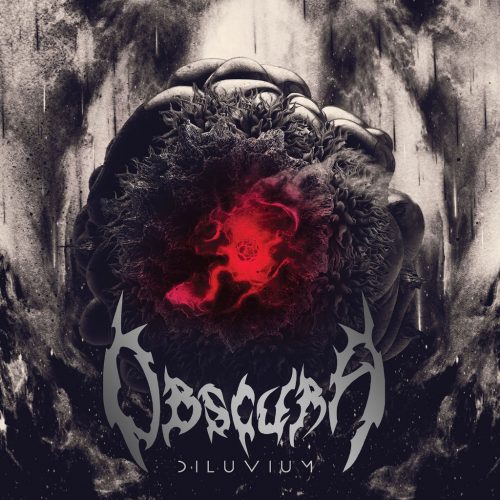(This is Andy Synn’s review of the new album by the celebrated German band Obscura, which will be released on July 13th by Relapse Records.)
Where to start with this one?
Obviously the name Obscura should be familiar to the majority (if not all) of our readers, as the band – these days comprising creative (and somewhat controversial) linchpin Steffen Kummerer alongside guitarist Rafael Trujillo, drummer Sebastian Lanser, and resident uber-bassist Linus Klausenitzer – have long since established themselves as one of the big names of Progressive/Technical Death Metal.
What they, and you, may not be aware of, however, is that, despite all the line-up changes, intra-band friction, and media-managed drama of the last few years, Obscura have been actively engaged in crafting a ten-year long, four-album deep, conceptual cycle – beginning with 2009’s Cosmogenesis (origin), and then moving through further phases with 2011’s Omnivium (evolution), and 2016’s Akróasis (consciousness) – which is finally about to conclude with the release of Diluvium, representing not only the end of the cycle, but also the end of an era for Kummerer and co.
So, with that in mind, perhaps the real question you should be asking yourself right now is… can this record possibly live up to those lofty expectations, and truly deliver the ending which this saga deserves?

Photo Credit: Christian Martin Weiss
The answer, you’ll be pleased to know, is an emphatic “yes” from me, as Diluvium ultimately represents not only the culmination of a decade’s worth of work and growth by the ever-evolving entity known as Obscura, but is also probably the band’s most purposefully “progressive” album yet, with many of the songs adopting a much looser, much more free-flowing feel than the hyper-focussed, intelligently designed precision which characterised the group’s previous works.
Of course if you’ve been paying close enough attention over the years, then this revelation probably shouldn’t come as a major surprise, seeing as how it’s arguable that each of the previous albums in this series has showcased a subtly different facet of the band’s core sound, from the adaptive hooks and fluid forms of Cosmogenesis, or the growing heaviness of Omnivium, to the cerebral technicality of Akróasis (which I picked out as one of the best albums of the year in 2016).
That’s not to say, by any means, that the material which makes up Diluvium is lacking in hooks, heaviness, or technicality – far from it, in fact. It’s just that the overall impression I’ve formed of this album after listening to it multiple times is one of proggy indulgence, with the quartet seeming much happier to simply let the tracks develop organically this time, with less conscious or calculated intervention or interference.
Whether this was a consequence of the band’s line-up finally stabilising, or a realisation that the end of the cycle was the time to let go a little, is unclear but, whatever the reason, it’s led to the creation of some of the most nuanced and natural-sounding songs of the band’s career.
Opener “Clandestine Stars”, for example, is not only one of the shortest songs ever written under the Obscura banner, but also one of the most perfectly proportioned. For all its frantic pace and plethora of complex pieces, it never feels over-stuffed or unbalanced, which is an impressive achievement in itself.
Similarly, while “Emergent Evolution” effortlessly maintains the electric energy levels of its predecessor it also opens things up in a superb display of increasingly dynamic songwriting, such that the journey it takes the listener on seems simultaneously more immersive, yet more direct, than ever.
This sense of the songs, and of the album, as a journey, is something which really adds to the overall “progressive” feel this time around (with “Mortification of the Vulgar Sun” the first number to really go “all in” on this idea), despite the fact that the tracks which make up Diluvium are, on average, shorter and more concise in both shape and stature, than those on either Omnivium or Akróasis.
Other stand-out cuts include the multi-layered melodic magic of “Ethereal Skies”, the shamelessly proggy, and irresistibly catchy “The Seventh Aeon”, and massive closer “An Epilogue to Infinity” – though, truth be told, there aren’t any tracks on here which I’d actively characterise as weak or lacking, it’s just that some of these gems shine that little bit brighter than the others!
So chalk this one up as another win for Obscura, as well as a more than fitting conclusion to their epic endeavour. Where they go from here is anyone’s guess!
Pre-order:
http://www.relapse.com/obscura-diluvium/
Facebook:
https://www.facebook.com/RealmOfObscura/

